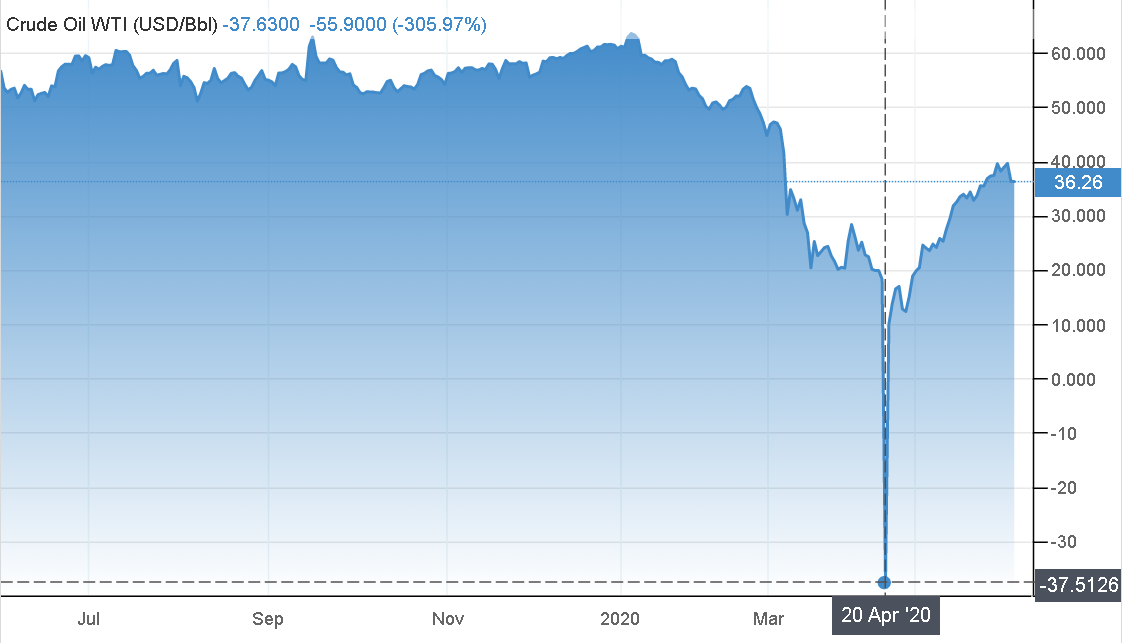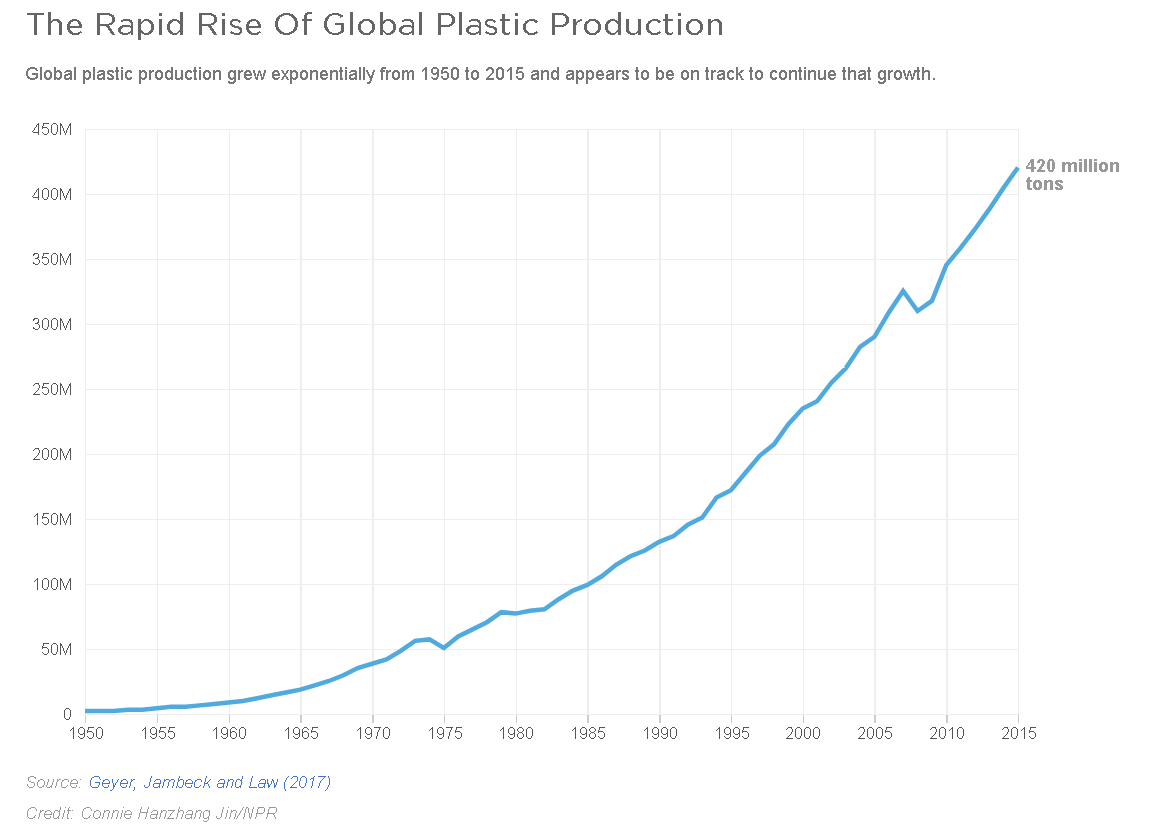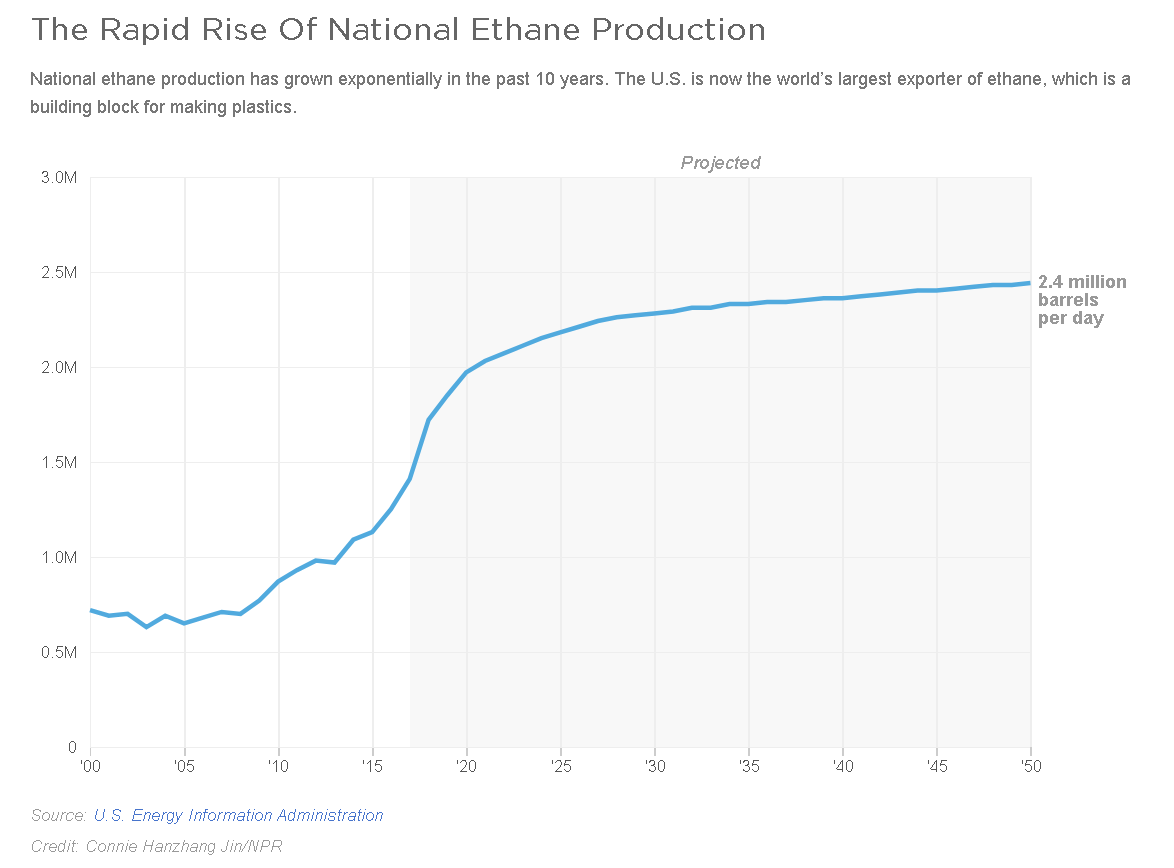There's a surprising competition currently growing between the oil & gas market and the recycling industry.
In 2020, we’ve seen a lot of uncertainty in financial markets due to global shocks such as economic recessions, COVID-19 quarantines, and political disputes. This is especially true for commodities markets such as the markets for petroleum products. Trading prices for commodities like crude oil sharply declined or even plunged into negative values around April 2020 (Source).

But this isn’t an article about the complexities of financial markets. Instead, I’d like to talk about the surprising implications of these petroleum products’ price fluctuations when it comes to the plastic recycling industry. To start off, it’s no secret that plastic is made from petroleum products. More specifically, petroleum refining turns crude oil (the raw fossil fuel extracted from the ground) into gasoline, releasing byproducts like ethane. These byproducts can be used to create plastics (and other petrochemicals) (Source).
Plastic production makes up about 6% of oil consumption today (Source). That doesn’t seem like a lot, but about 90% of plastics are made from ‘virgin’ (new) oil and gas ‘feedstocks’ (raw materials). The remaining chunk consists of plastics made from recycling old products, biopolymer-based plastics, etc. This means that:
- We’re very reliant on petroleum products to produce the overwhelming majority of plastics.
- We can EITHER produce plastics from virgin oil and gas materials OR from alternatives like recycling or biopolymers. More of one means less of the other.
Now, the thing is that plastics production has been increasing rapidly ever since it first became major in the 1950s.

This can be attributed to many factors, but one of these factors is that it has become cheaper to manufacture plastics in general over all these decades. That being said, in any shorter amount of time, fluctuating oil product prices (like the ones we’re seeing in 2020) can make the production of plastic more or less expensive based on the price of its feedstock.
The issue is that when producers decide how to manufacture their products, they have a choice to make between using recycled plastics or using virgin petroleum products as feedstock. There are added challenges that come with using recycled plastics as feedstock for new plastic production (like maintaining the quality of the material — Source), so producers already have some incentives not to recycle plastics. That being said, producers can sometimes find recycled plastics to be a cheaper feedstock and gain positive social branding from using recycled plastics, so there are also some incentives.
The issue is that during market fluctuations, oil prices can decline so much (or even go negative) that it becomes cheaper to make plastics from virgin materials instead of collecting, sorting, and processing recycled plastics. Now, there is less economic incentive for plastic producers to use recycled plastics, so some will inevitably switch to using virgin materials. This is a major barrier when it comes to increasing recycling rates consistently.
Another issue is that when petroleum products’ prices are low, it’s less profitable to produce (and sell) the main product made from them: gasoline. But, oil refineries could always choose to instead turn more crude oil into plastics (which now have a cheaper feedstock) to make a larger profit. This leads to more and more plastics production (especially for single-use plastics), which are most likely to end up as pollution (Source).
*There is also another reason why single-use plastics production is increasing in 2020. Due to fears of the coronavirus spreading via the use of reusable plastic products, more and more items such as single-use gloves, bottles, bags, etc. are now being produced. There is more detail on the facts behind the matter here.
But What if Low Prices weren’t Short-Term?
What we’ve typically seen in the past decades is that short-term market fluctuations lead to falling oil prices, which in turn make it less profitable to use recycled plastics (thus, limiting the growth of recycling). But a more major issue is coming to play in the long term: oil and gas products might see permanently decreased prices.
In particular, natural gas products have become a lot cheaper to manufacture due to developments in hydraulic fracturing (or ‘fracking’) in the past few decades (Source). I won’t get into the details of how the process works or why it’s cheaper (there are more details here), but the result is that we have more natural gas available than ever before at cheaper prices than ever before.
Natural gas extraction through fracking creates a lot of ethane, which can be used for plastics production. This is leading to lower and lower prices of plastics production over time due to the cheap cost of fracking natural gas (Source).

Then, the situation for crude oil contributing to increased plastics production is also becoming more clear. In the long term, we will see decreased demand for many petroleum products (like gasoline, which is starting to see less growth due to factors such as more electric vehicles) (Source). This is not the case for crude oil being used to manufacture plastic products:
“The use of oil by the plastics industry is expected to increase in line with plastics production (growing by 3.5–3.8% annually); this is much faster than the growth in overall demand for oil, which is expected to increase by only 0.5% annually.” — The New Plastics Economy, The Ellen MacArthur Foundation
Due to this, many petroleum producers are heavily investing in new infrastructure to produce more and more plastics:
“Since 2010, companies have invested more than $200 billion in 333 plastic and other chemical projects in the U.S.” — The Plastics Pipeline, Beth Gardiner
This is a massive issue. No matter what the efforts are like in the recycling industry to tackle plastic waste, the long term solution has to be to decrease our plastics production in the first place. On a larger scale, this also harms other initiatives focused on addressing plastic pollution (like ocean cleanup efforts or lobbying for policies).
Far from the visions of more and more companies adopting recycled plastics until nearly all products are sustainably sourced, we have an imminent surge of plastic production as natural gas prices make production cheaper and more and more oil and gas companies invest billions in positioning themselves to take advantage of this. As Robin Waters (a consultant analysing this issue) put it:
“Unless production slows, they’ll just find something else to wrap in plastic.”
Further Reading:
